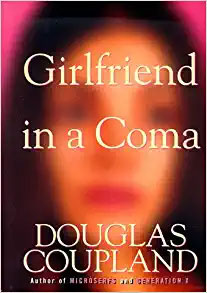
USA Today called Girlfriend in a Coma ”A message of hope and a challenge to . . . cynicism.” And they’re absolutely correct which is why this novel written by Douglas Coupland and first published in 1998 remains relevant, and ages very much like a fine wine.
This book doesn’t challenge you in a direct way at all, it tells you a story and through the characters who are asking themselves bigger and larger picture questions, you as the reader find yourself thinking about where you stand in those questions.
But what is this book about? The title pretty well covers it, but if you’re still looking for more, the back cover of the Harper Perennial paperback edition says;
“On a snowy Friday night in 1979, just hours after making love for the first time, Richard’s girlfriend, high school senior Karen Ann McNeil, falls into a coma. Nine months later she gives birth to their daughter, Megan. As Karen sleeps through the next seventeen years, Richard and their circle of friends reside in an emotional purgatory, passing through a variety of careers—modeling, film special effects, medicine, demolition—before finally reuniting on a conspiracy-driven super-natural television series. But real life grows as surreal as their TV show as Richard and his friends await Karen’s reawakening . . . and the subsequent apocalypse.”
I want to let you know now that I respect all of you as readers when I make the following assumption. When I give you a spoiler-free book review you still read the back cover or inside flap, or if I’ve included it as I did with the previous paragraph, you glance over it to make sure I wasn’t leading you astray.

Author Douglas Coupland
But with Douglas Coupland, as with Len Deighton and Terry Brooks, I’m reading these authors without abandon, so it doesn’t matter what the synopsis is, I’m along for the ride. And with Girlfriend in a Coma, I was amazed at what was in the paragraph I just shared with you. I was surprised she gave birth (genuinely surprised and in hindsight, it seems odd that it was just given away) plus I was wondering how apocalypse-like it was really going to get based on where the book was going.
But perhaps you need that, most people need more than to know the author, I understand that, which is why given my proclivity to utilize the back cover or inside flap to determine what is and isn’t a spoiler, you have what the marketers want you to have. But there’s still so much more.
The perspective of this book, even looking at the present in the book, which is now past, is disturbingly accurate. Everyone works too much, where have our hobbies gone (a theme I discussed on a recent podcast with author Kurt Sussman after I read this book), we don’t spend enough time doing nothing, and the one thing that the book doesn’t mention but hints at, where is our balance?
This is a very thought-provoking book. It’s not just because it’s a what are you doing with your life, what’s the meaning of youth, what’s the opposite of youth and what is its purpose, what is your purpose, what are your values, where do you stand, it asks all of those questions to you in these pages and yet even more that I haven’t mentioned.
Is it philosophical? Is it metaphysical? Is it religious? Is it something deeper or more core to our being? You’ll have to read it to find out, but to give you a small taste of what you are in for, here are a few quotes I pulled that have meaning and/or relevance to me well beyond the context of their place in Girlfriend in a Coma.
- Youth is the time of life lived for some imaginary audience.
- “…what’s the point of being efficient if you’re only leading an efficiently blank life?”
- I think it’s human to confuse history with time.
- Exposing hypocrisy in itself doesn’t make you a moral person…
- We really don’t seem to have any values, any absolutes. We’ve always maneuvered our values to suit our immediate purposes. There’s nothing large in our lives.”
- “Nobody we knew had a second of free time remaining. All of it was frittered away on being productive, advancing careers and being all-around efficient. Each new advance made by ‘progress’ created its own accelerating warping effect that made your lives here on earth feel even smaller and shorter and more crazed…”
 If you’ve taken of my suggested readings of Coupland’s other works Generation X, Microserfs, Shampoo Planet, Life After God, or Polaroids from the Dead, then I can’t tell you to read this book any more forcefully than it should be the next book you pick up.
If you’ve taken of my suggested readings of Coupland’s other works Generation X, Microserfs, Shampoo Planet, Life After God, or Polaroids from the Dead, then I can’t tell you to read this book any more forcefully than it should be the next book you pick up.
If you haven’t picked up any of the others yet, maybe this is the one you should try first. But know that if you like this, you’ll enjoy all the rest. They aren’t the same, not one of Coupland’s books is “ah yes, more of the same here,” but there are similarities that make it possible for me to say that if you enjoy his style you’ll enjoy all of them.
At least so far that’s the way it is.
So, whether you pick up Girlfriend in a Coma or any of the other Coupland’s I’ve mentioned, enjoy yourself, and happy reading.